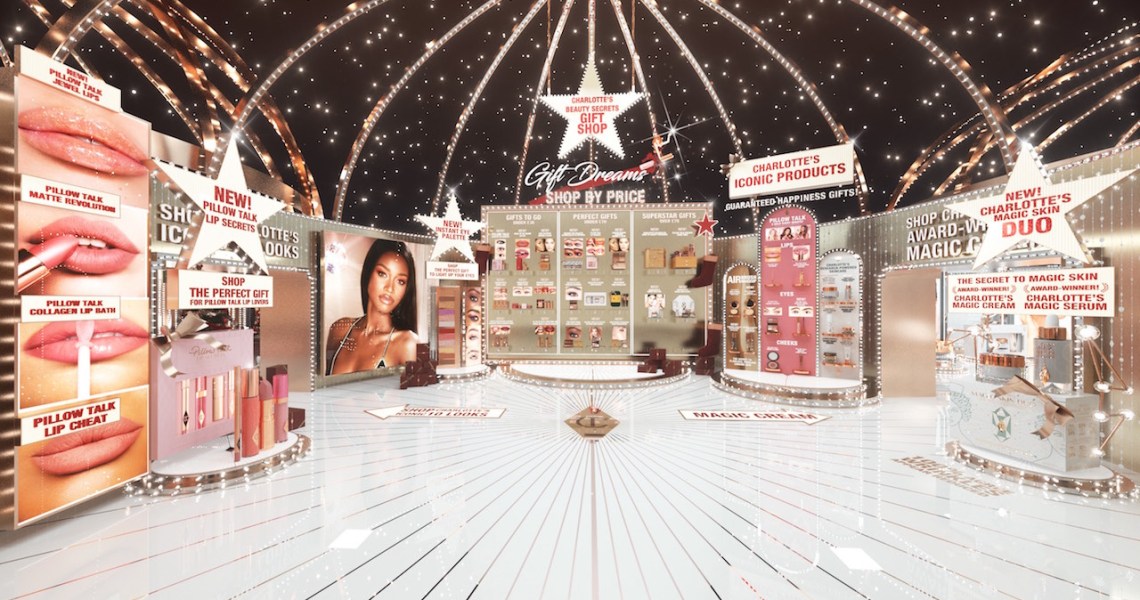As Covid-19 numbers increase in North America and Europe heading into the holiday shopping season, beauty brands like Charlotte Tilbury are turning to VR to replace the in-store shopping experience.
On Wednesday, Charlotte Tilbury Beauty launched a holiday-themed interactive VR shop to be accessed via a homepage link, complete with twinkling lights and gift set recommendations. Supported by VR e-commerce startup Obsess, the game-like online store allows users to browse through virtual “rooms” while being guided by a video avatar of brand chairman and CCO Charlotte Tilbury. It also lets them virtually try on products with an AR tool and watch tutorials for achieving the brand’s 10 signature makeup looks.
“Launching a virtual store at this time felt like a very natural progression,” said Tilbury via email. “I have designed all of my Beauty Wonderlands to completely revolutionize and disrupt the way people shop,” she said, referring to the brand’s physical and online retail channels. Although “brick-and-mortar stores have their own unique magic that can never be replaced,” she said she has “captured all of that joy and brought it to … the comfort of your own home,” with the VR shop.
“We are creating a lot of holiday virtual stores,” said Neha Singh, the founder and CEO of Obsess. She noted that Charlotte Tilbury is one of 15 clients going live with virtual stores in the next month, which is nearly equivalent to the number of VR stores the company has launched so far this year.
“I want to make gifting and shopping for beauty easy to use, easy to choose and easy to gift for everyone, everywhere,” said Tilbury.
With a growing roster of clients including Maison Christian Dior, Ulta, Coach and Tommy Hilfiger, Obsess announced on October 27 the closure of a new seed funding round from Venture Reality Fund, WXR Fund and Jump Capital. The startup now has $3.4 million in funding, and brands are expressing growing interest in experiential virtual retail models during the pandemic.
“Brands are looking for ways to engage their customers deeper online, because they know that the in-store experience either might be closed or might be very limited,” said Singh.
Ad position: web_incontent_pos1
The Charlotte Tilbury VR store will be a permanent fixture that will receive a new look after the holidays. Through the store, participants can receive personalized advice and product recommendations, watch live events with Tilbury and special guests, and invite a friend to join them on a video call and shop with them. The beauty label, which was acquired by Puig in June this year, has doubled down on new digital initiatives during the pandemic, including TikTok influencer marketing, on-site shoppable livestreaming and virtual consultations.
One of the main concerns brands have for the 2020 holiday season is pandemic-led product shortages. Singh noted that the company has plans in place to replace sold-out items on virtual “shelves” for clients if one sells out.
Brands are using the virtual stores to engage with audiences through social and email marketing. Charlotte Tilbury, for example, is promoting the feature on its homepage and asking users to join its mailing list to get access to the store. Other brands are working with Obsess to run Facebook and Snapchat ad campaigns that allow the VR experience to load directly in the social apps.
“Experiential retail will be a huge driver of e-commerce growth in the coming years,” said Martina Welkhoff, managing partner at the WXR Fund, in the company’s funding announcement.
While the pandemic has increased brands’ interest in VR shopping, Singh argued for the format’s staying power, stating that the old-school grid e-commerce model is in need of an update. “Customers are obviously getting the inspiration not on these brands’ e-commerce websites, but on other channels like Instagram,” she said.
Ad position: web_incontent_pos2
“The fact that we’re still using this basic interface that was created 25 years ago to sell books — and so much innovation has happened on the back end, but not on the front end experience — is very uninspiring. E-commerce needed to evolve, and this was the push that it got.”




